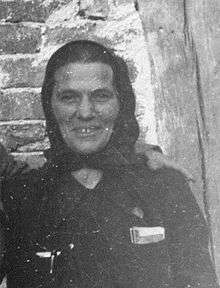Kata Pejnović
Kata Pejnović, née Bogić (21 March 1899 – 1966), was a Yugoslav feminist and politician.
Kata Pejnović | |
|---|---|
 Pejnović in 1942 | |
| Born | 21 March 1899 Smiljan, Kingdom of Croatia-Slavonia, Austro-Hungarian Empire |
| Died | 1966 (aged 66–67) |
| Nationality | Croatian |
| Occupation | Feminist, and politician |
Life
Kata Pejnović was born on 21 March 1899 in the village of Smiljan in the Kingdom of Croatia-Slavonia, then part of the Austro-Hungarian Empire to a poor Serbian family[1]. She completed her only formal education, elementary school, in 1911, before starting work to help feed her family. She married early, although little is known of her husband, and had three sons and two daughters with him. Pejnović became politically active in the local Communist movement from 1936 and was accepted into the Communist Party of Yugoslavia on 10 April 1938. Following the formation of the anti-communist Independent State of Croatia after the Axis invasion of Yugoslavia in April 1941, the Croatian fascists killed her husband and three sons in July. Bedridden from 1963, she died three years later.[2]
Activities
In the communist party, Pejnović focused on reducing ethnic tensions between Serbs and Croats and women's issues. To help spread anti-fascist propaganda among the women of Croatia, she helped to found the first women’s newspaper, Woman in Struggle (Žena u borbi), in partisan-controlled Croatia in March 1942. Later that year, she was the only woman delegate to the Anti-Fascist Council for the National Liberation of Yugoslavia (Serbian: Антифашистичко веће народног ослобођења Југославије) in November and Pejnović was elected President of the Antifascist Women’s Front (Antifašistički front žena) shortly afterwards. She was elected to the Central Committee of the Communist Party of Croatia in 1948 and repeatedly served in the Parliament of the People’s Republic of Croatia and twice in the Federal Assembly.[3]
Notes
- "Srpsko Narodno Vijeće :: Kata Pejnović". snv.hr. Retrieved 2019-04-12.
- Brkljac̆ić, pp. 420–22
- Brkljac̆ić, pp. 421–22
References
- Brkljac̆ić, Maja (2005). "Pejnović, Kata". In Haan, Francisca de; Daskalova, Krassimira; Loutfi, Anna (eds.). Biographical Dictionary of Women's Movements and Feminisms in Central, Eastern, and South Eastern Europe: 19th and 20th Centuries. New York: Central European University Press. ISBN 978-963-7326-39-4.